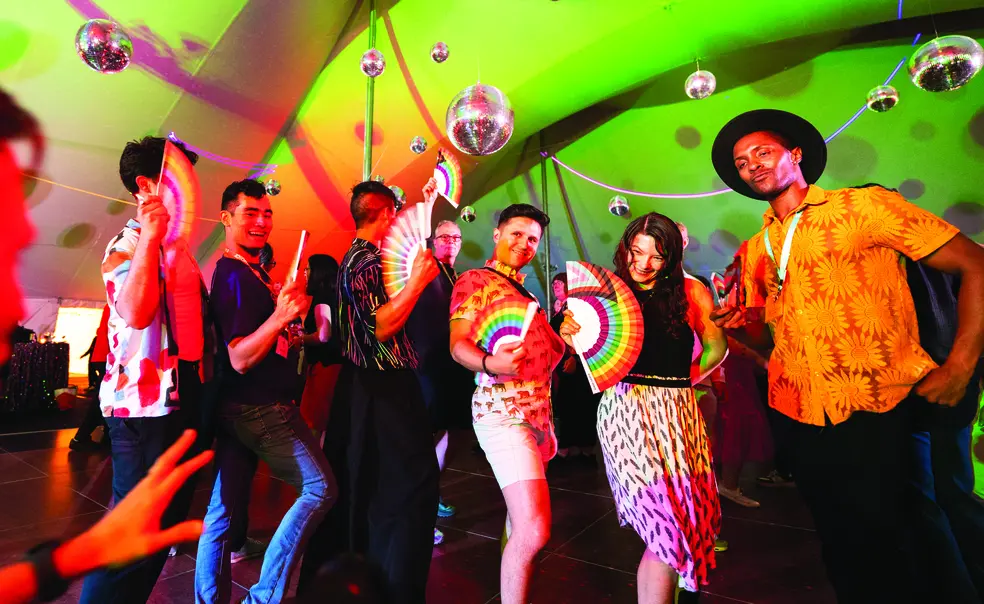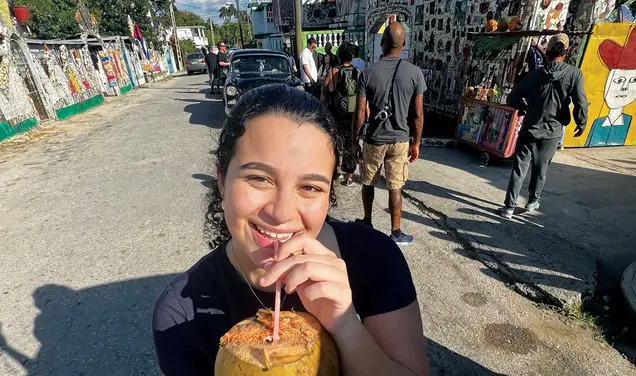Princeton’s LGBTQ+ Alumni Conference Honors ‘Every Voice’
‘...I think Princeton moved in a really positive, progressive direction over recent years, so I’m delighted to be back,’ said Michael Solis ’07
From soft-spoken personal and sometimes painful reflections to hopeful and bold discussions about the future of being queer, more than 600 alumni and their guests gave voice to the LGBTQ+ experience at Princeton at Every Voice, the first alumni affinity conference since the pandemic, from Sept. 19 to 21.
Throughout the weekend — which featured more than 120 speakers as well as art installations, receptions for affinity groups, and a Saturday night showcase with drag, dance, poetry, and music — many Princetonians touched on the difficulties that often came with being queer at Princeton as a student, particularly in the 1960s and ’70s, but the feeling on campus throughout the conference was that of cautious optimism and joy.
“The Princeton of today is truly transformed from the time that many of us were students here,” said Provost Jennifer Rexford ’91 at Friday morning’s opening remarks. Many attendees were astounded to hear that, according to Rexford, a survey of the Class of 2026 showed that one in four identify as LGBTQ+.
Many of the conference attendees “were not able to build a strong network of Princetonians” when they were students, says Yolanda Silva, director of affinity programs, “and so, I feel like these conferences are hopefully giving that opportunity ... . And seeing other people from the community and being able to be open and proud and just have those conversations, I think, was really powerful.”
“As Tigers, we each have our own story, backgrounds, and experiences, and one strength of our global community is that we celebrate each other individually and collectively,” said Monica Moore Thompson ’89, president of the Alumni Association, in her remarks.
"Every Voice is about all our voices. It’s about who we are as individual alumni, and it’s about creating community in which each of us is heard.”
Princeton’s long and winding path toward acceptance and inclusion was particularly evident at a session in Mudd Library where April Armstrong *14, a library collections specialist, presented relevant artifacts from the University Archives, starting chronologically with a program from 1882 that detailed students’ planned speeches, which were canceled when they came dressed as Oscar Wilde, who was known for pushing back “against dominant ideas about masculinity,” according to Armstrong. The students’ actions made them ineligible for orations prizes.
“I enjoy seeing open displays like that throughout history,” said Liz Peters ’79. “I find it’s affirming, [and] it also puts into perspective the fact that we’ve always been here.”
Peters said one of her favorite parts of the weekend was meeting “all of the other members of ’79 and ’77 who hadn’t been out” as students. “I teased them and said, ‘Where the hell were you? We were easy to find.’”
The broad range of student experiences at Princeton was especially pronounced at the Thursday night plenary, where six alumni read personal passages from throughout their queer journeys. Ricardo DeLeon ’86 remembered thinking he needed “to try harder” to fit in after someone called him gay, but Sam Gravitte ’17 received the “biggest embrace of [his] life” after coming out to his fellow lacrosse players.
“We’ve heard a lot of stories of people’s experiences on campus: the good, the bad, and the ugly,” said Michael Solis ’07. “And I think Princeton moved in a really positive, progressive direction over recent years, so I’m delighted to be back.”
For John Wood ’83, the weekend was a wonderful reminder of the first and only other Every Voice conference in 2013, where he felt for the first time that he could be “fully seen by the University as who I am,” and where he met his husband, Zahid Chaudhary, an associate professor of English. Wood said he thinks Princeton has “evolved even more since then, in the interim 11 years that happened, which is great.”
During one meal, David John Attyah ’89 sat with alums from the 1980s, ’90s, and ’00s, and felt it was “like a timeline of how Princeton had evolved around gender and sexuality, and in that regard, it’s really powerful and important work, and it’s hard to do, and I appreciate that Princeton’s willing to do it.”
In a conversation with Rexford, President Christopher Eisgruber ’83 said that inclusivity is currently under attack, but Princeton is “focused on diversity because it is essential to excellence.”
The conference was originally scheduled for 2021, but planning was disrupted by the pandemic. However, Silva says the delay actually presented an unexpected opportunity, as it allowed the University to convene a 10-month task force on the future of affinity programming, which confirmed the importance of these events to alumni.
Silva says her team then refocused on Every Voice, holding 12 focus groups with more than 300 alumni in the year leading up to the conference, which ensured “that we got input from a very diverse group of people.” She said one of the most common themes from those conversations was the importance of a dynamic conference — “this community didn’t want to just sit down and be talked at.”
Heather Rae Martin ’07, a speaker and member of the steering committee, said “it was very important [to] me for there to be intersectional conversations, for there to be as much visible representation as possible throughout the weekend.”
Four current students reflected on their experiences in a session titled “Voices of the Present” on Friday afternoon. Haley Choueiri ’25 said she has no problem holding hands with her partner on campus, while graduate student Cass Y. Kim said that they found it difficult to be out in STEM spaces, noting “not every field has notable, visible [LGBTQ+] people in their history.”
Alex Rosado-Torres, associate director of the Gender & Sexuality Resource Center (GSRC), announced at one session that alums now have an easily accessible and searchable way to review the LGBTQIA+ Oral History Project, which originally launched in 2017 and was formerly housed on a clunky website with other Mudd archives. The new digital exhibit, which can be found at princetonlgbtqhistory.com, was launched to better showcase the more than 130 interviews with alumni spanning six decades about being queer at Princeton.
Rosado-Torres also announced the GSRC will host a queer and trans conference next fall, and the theme will be The Stories We Tell.
The next University affinity conference, for graduate alumni, will take place Oct. 9-11, 2025, and a conference for Asian alumni will follow.
For more listen to the PAWcast for a conversation between Reina Coulibaly ’24 and Ara Tucker ’01 at the Every Voice conference.












No responses yet